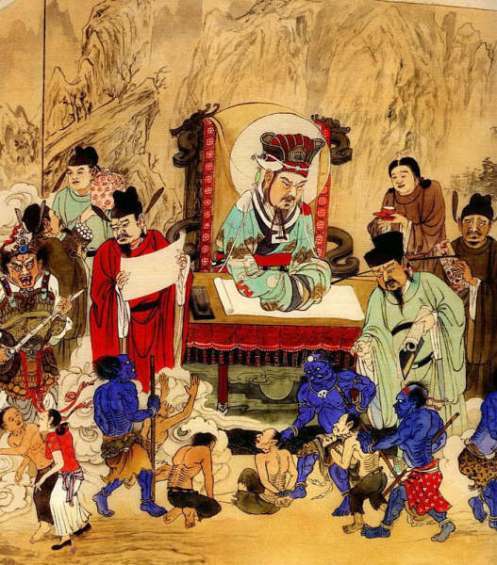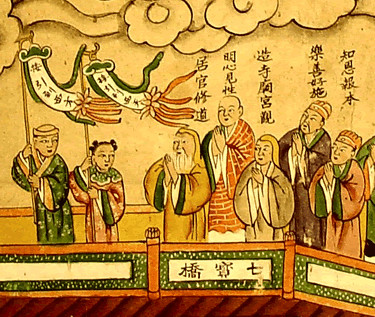I was that kid in middle school who was obsessed with Greek mythology. The way humans rationalize unexplainable things like creation and death is fascinating. There tend to be all powerful gods that represent forces of good and demons to represent forces of evil.
I genuinely enjoy exploring mythological tales. From festivals to ghost stories, you can find wisdom in mythological stories.
The power of mythology is in its symbolism. To understand the cultural psychology of a culture, take a look into their mythology. We can learn lessons from these generational stories to avoid similar tragic fates.
Ancient China's Belief in the Afterlife
So according to Chinese mythology, what happens when you die? Let’s take a journey through the afterlife and see if we can learn some lessons along the way.
Let’s journey with your deceased soul
When a person dies, the local Earth god takes a journey to the underworld alongside the soul to the local City god.
They look over the records of every deed done by the soul, like Santa’s Nice and Naughty lists.
Once the god reads the soul’s record, he sends the virtuous souls to the Bridge of Seven Treasures. He sends the wicked souls to the Ten Courts of Hell.
The Western conception of Chinese Buddhism has a laid-back, zen mentality. The Chinese afterlife is anything but.
Description: The First Court of Hell, overseen by King Qin Guang. According to Reed Magazine, souls are dragged in front of a karmic mirror that reveals misdeeds they committed. After the king checks the records, he divides the souls between Hell and the Bridge of Seven Treasures to the Western heaven.
Uh oh, your soul is wicked...
Welcome to Diyu. Literally translated, Diyu means “earth prison.” It is the land of the dead, or hell in Chinese mythology. It is depicted as a maze of torture chambers to help fallen souls atone for their sins.
In Buddhist interpretations, Diyu has ten “Courts of Hell” that are each ruled by a different judge. The judges are collectively known as the Ten Yama Kings.
These courts include but are not limited to: Hell of a Thousand Blades, Hell of Flowing Fire, Hell of Head Chopping, etc.
Description: The Fourth Court of Hell, overseen by King Wu Guan. Here thieves and arsonists are crucified, liars are impaled on hooks, cheaters are sawn in two, and sinners are drowned.
The idea of this damnation is a “supernatural compensator”. Wicked souls need to make up for their misdeeds one way or another. Unlike Western hell, Diyu is a purgatory to help lost souls atone for reincarnation. After their next life, the soul gets another shot at eternal peace.
Description: The Jade Record is an illustrated religious artifact dating back to the 19th century in China. It holds one of the first depictions of the torment wicked souls face in the Diyu.
Celebrate! Your soul is virtuous!
A rare soul is allowed to immediately leave the Underworld by the Golden and Silver Bridges. Each bridge leads to a very different destiny. It is up to the soul to choose between paradise and heaven.
The Golden Bridge takes the soul to the “Pure Land of the West” ruled by Buddha Amitabha. After meeting Amitabha face to face, the soul can reach nirvana and totally release from the reincarnation cycle. The soul has chosen to attain salvation from the cosmos itself.
19th century ink scroll titled, “Exemplary Souls on the Bridge to the Pure Land of the West”
The Silver Bridge leads to heaven, the most important domain of the cosmos. It is full of heavenly officials and gods who are ruled by the Jade Emperor. The soul that enters heaven can be reborn again as a god.
There is controversy within Chinese popular religion about which is more desirable: heaven or paradise? Which would you pick? Both rely on the impact and importance of Buddhist ideals within Chinese religious thinking today.
How does hell really impact you?
It’s hard to say if hell exists in anything more than a symbolic way. However, studies done by Professor Ken Brasher have shown how the hell of imperial China serves many real-life functions today.
The afterlife, quote, “promoted traditional virtues; reinforced social hierarchy; valorized the clergy; propagated the sutras; and offered the soothing consolation that no matter what tribulations one might face in this life, no matter how unfair things might seem, in the end the wicked would get what they deserve.”
This genre of mythology informed the ancient population’s belief systems. At the same time, it was wildly entertaining. The hell scrolls featured in this article were mass produced as popular art at the time. They reflect folk traditions and popular opinions, like political cartoons do today.
In a weird way, these brutal hell scenes reassure people. If you live a decent life, the courts of Diyu will take it easier on you than on your cheating neighbor. Even if you suffer for a bit, at least you get reborn!
By studying Chinese mythology, we can understand the ancient beliefs of China. More than that, we can see how they still permeate our philosophies today.







0 Comments